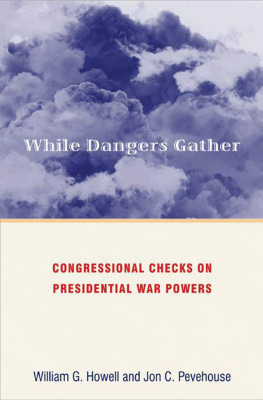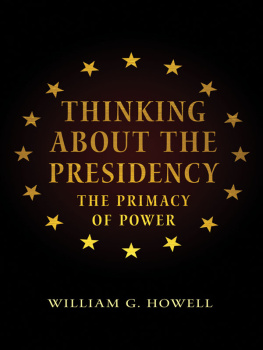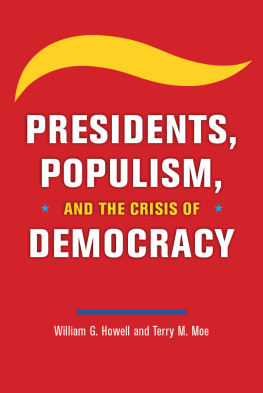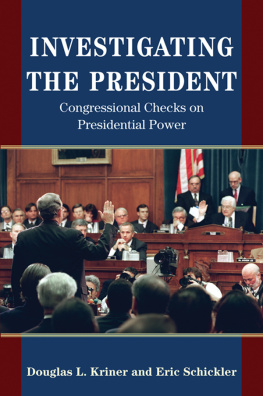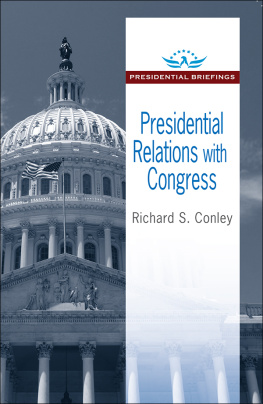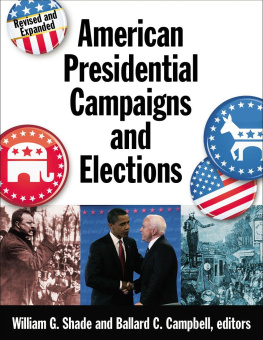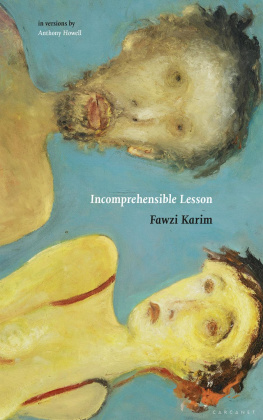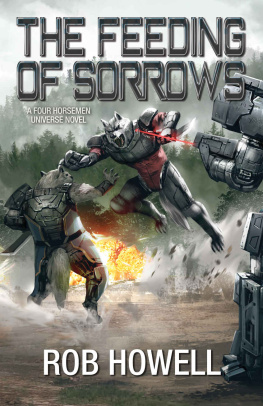Copyright 2007 by Princeton University Press
Published by Princeton University Press, 41 William Street,
Princeton, New Jersey 08540
In the United Kingdom: Princeton University Press, 3 Market Place,
Woodstock, Oxfordshire OX20 1SY
All Rights Reserved
LIBRARY OF CONGRESS CATALOGING-IN-PUBLICATION DATA
Howell, William G.
While dangers gather : congressional checks on presidential war powers / William G. Howell and Jon C. Pevehouse.
p. cm.
Includes bibliographical references and index.
ISBN 978-0-691-12515-2 (alk. paper) ISBN 978-0-691-13462-8 (pbk. : alk. paper) 1. Executive powerUnited States. 2. Legislative powerUnited States. 3. TerrorismGovernment policyUnited States. 4. War and emergency powersUnited States.
I. Pevehouse, Jon C. II. Title.
JK516.H68 2007
328.7307456dc22 2007013194
British Library Cataloging-in-Publication Data is available
This book has been composed in Sabon
Printed on acid-free paper.
press.princeton.edu
Printed in the United States of America
10 9 8 7 6 5 4 3 2 1
Contents
PART One
Background and Theory
CHAPTER 1
Possibilities of Congressional Influence
CHAPTER 2
Conditions that Abet Congressional Influence
PART Two
Testing Claims about Congressional Influence
CHAPTER 3
Trends in Military Deployments
CHAPTER 4
Responding to Opportunities to Use Military Force (with Douglas L. Kriner)
CHAPTER 5
Studies in Domestic Politics and the Use of Force
PART Three
One Causal Pathway
CHAPTER 6
Congress and the Media (with Douglas L. Kriner)
CHAPTER 7
The Media and Public Opinion
CHAPTER 8
Conclusion
APPENDIX A
Tables Relating to Chapter 3
APPENDIX B
Text and Tables Relating to Chapter 4
APPENDIX C
Table Relating to Chapter 6
APPENDIX D
Table Relating to Chapter 7
Preface
Which branch of government takes us to war? The executive? Legislative? Or some combination of the two?
The question runs deep. And for centuries scholars have sought answers: beginning perhaps most explicitly with Immanuel Kant and Charles-Louis de Secondat, Baron de Montesquieu; carrying through the Federalist Papers; preoccupying the imaginations of the greatest legal scholars of the eighteenth and nineteenth centuries, including the likes of William Blackstone and John Bassett Moore; transfixing the Supreme Court justices in the Prize Cases; motivating Edward Corwins famous observation that the Constitution is an invitation to struggle for the privilege of directing American foreign policy; and attracting the attention of some of our nations most famous political historians, from Arthur Schlesinger, Jr., to John Lewis Gaddis.
Among scholars, then, we are hardly the first to sort through the domestic politics of war. Nor are we even among relatives. In 1928, William Howells great-grandfather, then a faculty member at Yale Universitys political science department and the director of research at the Council on Foreign Relations, produced a volume that documented congressional efforts to influence U.S. foreign policy in conflicts between the War of 1812 and the Great War. Reflecting on this history, Charles P. Howland wrote that Congress and the Senate have sometimes objected to presidential war making... and have attempted, especially since the war, to control the Presidents discretion in such matters, with the result... that the conduct of foreign relations will be almost impossible of satisfactory direction if the Senate shall continue in future to interfere with and hamper the executive as it has done the last four years.
Three-quarters of a century hence, Howlands insights resonate still. During the lead-up to a military venture, the discretion to use force obviously remains with a president who enjoys extraordinary powers, not least of which is the ability to act unilaterally. But the presidents war powers also have limits, as Congress occasionally interferes and hampers the executive in ways that make the successful prosecution of a war immensely difficult. Congress matters, and matters greatly: to a nations ability to credibly convey resolve to enemies and allies alike, to campaigns for public support, to the presidents discretion over military decision making, and to the ultimate conduct of a military venture. Does the president or Congress ultimately decide whether we go to war? Obviously, they both do.
What possibly is left to say? A fair bit, we think. Scholars have accumulated only partial answers to vital questions about how our system of governance approaches issues involving war. During the lead-up to a military operation, who within Congress is most likely to oppose the president? And under what conditions are presidents likely to abide their concerns? How, for instance, do uncertainty about a military operations execution and the partisan composition of Congress jointly influence the presidents willingness to deploy young men and women abroad in the service of some national objective? And how can Congress possibly influence executive decision making, when presidents have at their disposal such vast informational and tactical advantages? The questions get to the heart of how our system of checks and balances functions in the most perilous and uncertain of timesnamely, when our elected leaders contemplate the prospects of war.
In several ways, this book advances our understanding of the domestic politics of war. For starters, it considers many more manifestations of congressional influence than previous scholars have recognized. Interbranch struggles do not typically resemble duels wherein the president and Congress mark ten strides and fire, leaving the victor standing and the vanquished bleeding in the dirt. In politics, both often end up wounded, just as both can claim a measure of success. The trick, we think, is to account for a fuller range of possible outcomes when two branches of government, with opposing objectives and different resources at their disposal, square off against one another. This book does more than identify instances when Congress, with one carefully fired shot, fells a president. It documents those occasions when it maims him, when it grazes a limb, and perhaps most importantly, when a president walks away from a fight he feared losing. If we hold as our standard of proof the obliteration of White House military planning, we overlook the copious ways in which Congress influences presidential decisions about how often to use force, which kinds of foreign crises warrant actions and which kinds do not, the timing of a deployment, and its scope. The counterfactual to a world of congressional irrelevance does not require the elimination of the largest and most vital deployments from the historical record. Instead, the correct counterfactual may be a delayed deployment in some instances, a shorter one in others, or the reassignment of national priorities in others still.
This book also pays careful attention to the mechanisms by which Congress manages to influence presidential decision making on the use of force. Sometimes Congress intervenes directly, establishing reporting requirements, setting budgets, holding hearings, or passing laws that restrict the scope or duration of a military deployment, and in these instances, the connection between the actions that Congress takes and the decisions that presidents make are more easily discerned. In other instances, though, congressional influence follows a more circuitous route. When members of Congress proclaim their reluctance to use force abroad, they may encourage U.S. adversaries who then fight longer and harder, just as they may influence the publics willingness to back their president. In either case, the president may have cause to scale back or even abandon a military venture, even though Congress has not passed a single bill or resolution that formally curtails his war powers. He does so, though, not so much because Congress itself matters, but rather because the actions that members take set in motion forces that materially impact his capacity to wage war successfully.

